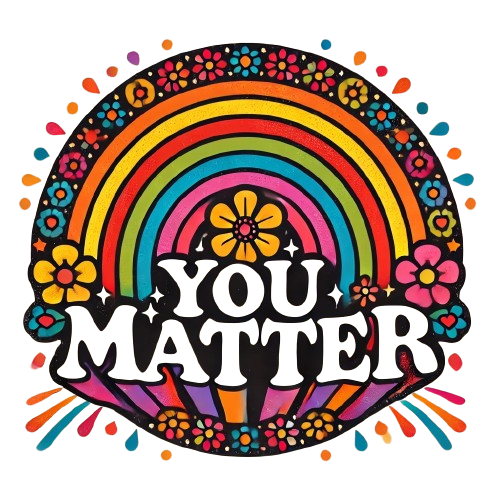 Welcome to ESC 110 F: Introduction to Climate Science with Professor Sean (CRNs 10478, 13896), Fall 2024
Welcome to ESC 110 F: Introduction to Climate Science with Professor Sean (CRNs 10478, 13896), Fall 2024
PDF Version | Infographic Version | Syllabus Only
Classes begin Monday, August 26, 2024, and end Saturday, December 14, 2024.
I’m W. Sean Chamberlin, PhD. But please call me Professor Sean. (You can read more about me here.) I’ll call you Professor, too, if you like. We can all learn from each other, right? That makes us all professors.
In case you’re nervous about this class, that’s okay. I get anxious in uncertain situations, too. Just know that I designed this course for you to pass and be successful in your life and career.
No matter who you are or where you come from, no matter what life experiences have challenged you and may still challenge you, there’s a place for you in this course.
We are lucky to have you here. We look forward to learning from you.
Now, in case you need to reach me, bookmark this page right now. Or take a screenshot. Send me an email. Text me a “howdy.” That way, you’ll have my email and text number on your phone. Here are the deets (though at 68 years old, I really shouldn’t be using that word):
- For the fastest response, email me at exploreworldocean@gmail.com or through Canvas (see below). I answer emails from 6:30a–6:30p, Monday–Saturday.
- You can text me questions whose answers don’t require a lot of typing (I’m a slow texter) at (714) 768-7082. I’ll do my best to answer texts (within an hour or two) from 9–5p, M–F.
- You can leave a voicemail at (714) 992-7443. Please leave a message. (Recorded messages go to my email.). I’ll get back to you as soon as possible.
- Feel free to reach out to me on Twitter or LinkedIn. Okay, Instagram, too, but I only go there to get spiritual with Raveena.
And now, I present you with our road map for the course. Consider it (and me) your guide to a successful and fulfilling semester. By the way, there are about 21 printed pages here, including what you’ve already read. According to ChatGPT 4.o, it should taken you about 15 minutes to read, 20 minutes to read carefully, and 25 minutes if you want to ace the syllabus quiz on the first try.
Table of Contents (click on link to go to that section)
- 0.0 First Things First . . .
- 1.0 Land Acknowledgement
- 2.0 General Course Information
- 3.0 My Teaching Philosophy
- 4.0 What I Expect from You
- 5.0 JEDI Statement
- 6.0 Americans with Disabilities Act (ADA) Statement
- 7.0 Non-Discrimination and Sexual Harassment Statements
- 8.0 Academic Honesty and College Policies
- 9.0 Emergency Response Statement
- 10.0 Undecided on a Major?
- 11.0 Course Synopsis
- 12.0 Why This Course Matters
- 13.0 You Are an Oceanographer Now
- 14.0 Interweb: Have a Plan B
- 15.0 Log In and Thrive!
- 16.0 Course Withdrawals: Sometimes Life Interferes
- 17.0 Time Flies When You’re Learning
- 18.0 Deadlines and Lifelines
- 19.0 Objectives and Outcomes
- 20.0 Your Textbook: It’s Free!
- 21.0 Supplies (Not Da Kine Kind)
- 22.0 The Fullerton College Library: Your Home Away from Home
- 23.0 Tutoring: They’ve Got the Answers
- 24.0 Canvas: Like When You’re Invited to a Weird Relative’s House
- 25.0 I Love E-Mail, Especially When It’s From You
- 26.0 Visit My Office, aka the Sea Cave
- 27.0 Course Overview
- 28.0 Schedule of Topics and Due Dates
0.0 First Things First . . .
College (and life) can be stressful. It’s important to remember to take care of yourself. It’s easy to get caught up in the chaos and confusion and lose sight of your physical, mental, and spiritual health.
To maintain a healthy lifestyle and perspective, try to observe the following:
- Eat well and properly (click here if you struggle with food security);
- Exercise regularly (if even for a few minutes; see here for suggestions);
- Avoid excessive drugs and alcohol (and check the signs of alcoholism);
- Get plenty of sleep (6 tips for a good night’s rest);
- Take time to RELAX (this is actually a helpful way to learn more effectively; see here);
- Refresh your spirit (a few suggestions…)
Most stress can be alleviated by talking to someone: a friend, a family member, your pet, or a professional. Successful people are ones who are not afraid to ask for help.
You may also reach out to me or call the Fullerton College Health Center at (714) 992-7093.
Also, I suggest you add the phone numbers for Campus Safety to your smartphone in case of an accident, emergency, or crime.
Emergency Phone Number: (714) 992-7777
Fullerton Police Department: (714) 738-6700
Fullerton Fire Department: (714) 738-6122
For life threatening events: Call 911
1.0 Land Acknowledgement
Fullerton College is located on the unceded ancestral lands shared by the Gabrielino-Tongva Nation and the Juaneño Band of Mission Indians/Acjachemen Nation, who have been the traditional caretakers since time immemorial. Tongva and Acjachemen peoples maintain a strong presence in North Orange county and throughout Southern California, protecting their homelands, knowledge systems, and cultures for the next seven generations. We acknowledge the ingenuity, survival, resilience, and strength of their descendants and relatives––past, present, and emerging. We also acknowledge the labor of those who work on and care for these lands, both in the past and today, and all those who act in solidarity with Indigenous struggles.
2.0 General Course Information
These course guidelines are what this course is all about. Being familiar with them will help you do well in the course. Scan through them to get a general idea of where we’re headed and how we’ll get there, then use the Table of Contents to find information when you need it. There’s a lot here (some of it I’m “required” to tell you). Save it, print it, post it somewhere you can see it everyday. Like a box of See’s candy, it’s best consumed one piece at a time.
- This course is conducted ASYNCHRONOUSLY. There are no orientations, class meetings, or campus exams.
- Students are encouraged to ENGAGE THOUGHTFULLY with the instructor and other students throughout the course, even beyond. (I love hearing from former students.)
- ACCESSIBILITY is a top priority. If you encounter some part of the course that creates difficulties for you, please let me know asap. I’ll do my best to accommodate you. (See also section below on Americans with Disabilities Act compliance.)
3.0 My Teaching Philosophy
- Provide a safe, equitable, just, and inclusive classroom environment for everyone.
- Inspire curiosity and a love for learning.
- Create opportunities for hope and positive change.
I promise to do my best to follow these principles every day.
4.0 What I Expect from You
- A desire to learn because education is important to your future and your happiness;
- The motivation to learn because learning takes effort;
- Respect towards your classmates and me because a world in which people respect each other is a kinder, safer, and more beautiful place to live and love.
I hope you will do your best to follow these principles.
5.0 JEDI Statement
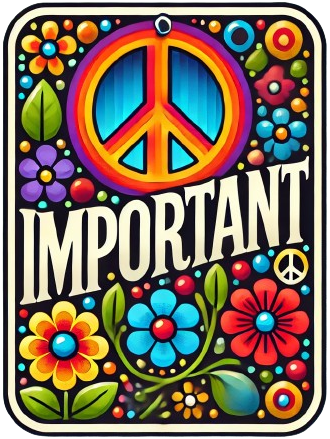 In this course, we practice the ways of the JEDI, which, of course, stands for Justice, Equity, Diversity, and Inclusion. The JEDI embraces social justice initiatives, such as anti-racism, accessibility, cultural competence, intersectionality, allyship, empowerment, and more. The JEDI respects diversity. Nature learned this 3.5 billion years ago. Humans live in a world made possible by the diverse assemblage of organisms that provide our oxygen, nourish our bodies, and recycle our wastes. It’s the life force. The JEDI practices love and kindness in the awareness that though we we all travel different paths, we are united as human beings. And none of us are perfect.
In this course, we practice the ways of the JEDI, which, of course, stands for Justice, Equity, Diversity, and Inclusion. The JEDI embraces social justice initiatives, such as anti-racism, accessibility, cultural competence, intersectionality, allyship, empowerment, and more. The JEDI respects diversity. Nature learned this 3.5 billion years ago. Humans live in a world made possible by the diverse assemblage of organisms that provide our oxygen, nourish our bodies, and recycle our wastes. It’s the life force. The JEDI practices love and kindness in the awareness that though we we all travel different paths, we are united as human beings. And none of us are perfect.
While these topics can sometimes make us feel uncomfortable, discomfort can be a sign that we are challenging ourselves and growing. That’s okay. We’re all here to better ourselves, our classroom, and the world we live in. If we approach these conversations with an open mind, a loving heart, and a willingness to learn from each other, we can create a safer, more inclusive, and more just environment for everyone.
6.0 Americans with Disabilities Act (ADA) Statement
Several years ago, a blind student enrolled in my oceanography lab class. I’ll never forget how much I learned from her. In the lab report following a trip to the beach, she described the sounds of the waves washing up on the beach, the chiming of shells caught in their swash, and the squawking of birds in the air. She heightened my awareness of soundscapes, the sounds that surround us in our everyday lives. The experience inspired me to create learning activities focused on sound. It’s just one of many examples of how we all learn from each other.
If you have a disability of any kind, you are welcome here. I’ll do my best to accommodate you. In fact, because some students feel uncomfortable about divulging their disability or are unaware of a disability, I allow twice the standard time for all timed assessments (quizzes and exams). My 30-minute quizzes have become 60-minute quizzes. My 90-minute exams have become 180-minute exams. And if you still need more time, contact me. We’ll work it out.
And if you need other accommodations (such as an exam reader or a text in braille), contact Disability Support Services (DSS) at (714) 992-7099 or visit the DSS office in Building 840, Room 842. They are wonderful people and more than happy to help you.
7.0 Non-Discrimination and Sexual Harassment Statements
The North Orange County Community College District and Fullerton College are committed to to providing an educational, employment, and business environment in which no person shall be unlawfully denied full and equal access to the benefits of, or be unlawfully subjected to discrimination on the basis of ethnic group identification, national origin, religion, age, sex, gender, gender identification, gender expression, race, color, medical condition, genetic information, ancestry, sexual orientation, marital status, physical or mental disability, or military and veteran status, or as otherwise prohibited by state and federal statutes, or because he or she is perceived to have one or more of the foregoing characteristics, or based on association with a person or group with one or more of these actual or perceived characteristics in any program or activity of the District that is administered by, directly funded by, or that receives any financial assistance from the Chancellor or Board of Governors of the California Community Colleges. Discrimination on the basis of sex or gender also includes sexual harassment.
Students and employees who believe they have been subjected to unlawful discrimination, including sexual harassment, or who seek information regarding the District’s Unlawful Discrimination Policy should contact the Office of the Vice Chancellor, Human Resources at (714) 808-4826.
Students who are victims of sexual assault occurring on District property or on an off-campus site or facility maintained by the District, or who seek information or assistance regarding a sexual assault, should contact the campus Director of Health Services at (714) 992-7093 or the Director of Campus Safety at (714) 992-7080. Except as may otherwise be required by law, all inquiries will be maintained in confidence. Victims of sexual assault should immediately report the incident to the Campus Safety Department, Fullerton Police Department and the Title IX officer. The Title IX Office for the campus is the Vice President of Student Services (714) 992-7074. The Title IX Officer for the District is the Director of Human Resources (714) 808-4822.
8.0 Academic Honesty and College Policies
If you haven’t reviewed them lately, you might want to take a look at the guidelines, policies and procedures in the college catalog. These guidelines cover academic honesty, nondiscrimination, and sexual harassment. Check them out. In fairness to others and to prepare you for a successful career and life, I expect you to uphold these principles. You may read them online at the Fullerton College website, https://www.fullcoll.edu/schedule/
9.0 Emergency Response Statement
An earthquake or extreme weather event may happen at any moment. Take note of the safety features in and around where you complete your work or when visiting campus or other locations. Note the posted evacuation routes. During strong earthquakes, it is recommended to duck, cover hold! Duck beneath a desk, cover your head with your hands, and hold on to your caboose until the quaking stops. Running out of a building during an earthquake can be deadly. Listen to “The Rock” in San Andreas, the movie. Also, if you feel an earthquake while at the beach, I advise getting to higher ground immediately. Tsunami can happen in Southern California. And they can be deadly.
10.0 Undecided on a Major?
I love encouraging students to check out a career in oceanography, meteorology, geology, or earth science. You may be amazed at the opportunities in these fields. Even if you’re pursuing non-scientific subjects, such as art, writing, communications, business, marketing, technology, computers, law, and just about any other subject, science needs you! All that’s required is a passion for science. Just email me and we’ll set up a time to chat.

11.0 Course Synopsis
11.1 The Low Key Description
Introduction to Climate Science examines the scientific evidence and real-world consequences of human-caused climate change in the context of past climates (e.g., Ice Ages, Hothouse Earth), current climate conditions, and climate model projections in the short- (next 20-50 years) and long-term (next 100s to thousands of years). This course emphasizes learning-by-doing, that is, it emphasizes activities that engage the student in the course materials, and in exploring solutions to reduce the magnitude of future warming. The course invites discussion among your classmate and instructor and in exploration of climate science from a multitude of perspectives. This is, at heart (and credit-wise), a physics course. That means you are now a physics student. Post it on your Insta and watch the love flow.
11.2 The “Official” Description
This course engages students in a study of climate science including global warning and climate change. Students will examine interactions among Earth’s various climate subsystems – the hydrosphere, lithosphere, atmosphere and biosphere – and how exchanges of energy and matter between them govern Earth’s climate. The interaction of humans with the climate system will be woven throughout. (Degree Credit) (CSU) (UC) AA GE, CSU GE, IGETC
12.0 Why This Course Matters
Science courses help you gain the skills and confidence to learn unfamiliar and challenging information. They prepare you for situations when you might need to turn to science for help, such as:
- preparing for natural disasters,
- making health decisions,
- evaluating nutrition claims
- caring for a pet
- caring for a parent or older relative
- assessing the safety of household products
- responding to emergencies during outdoor activities.
Science courses also sharpen your ability to distinguish between facts and fictions, knowledge and opinions, data and myth/folklore, actual events and fake events, experts and non-experts.
Above all, science courses prepare you to be a better and more mindful citizen of the planet, to know how to live a sustainable lifestyle that ensures the health and well-being of future generations and our planet.
I hope that you are here to enrich your mind and your life to the fullest extent possible.
13.0 You Are an Climate Scientist Now
The definition of an climate scientist is a person who studies climate, the average weather on Earth over a long-period of time. Because you are studying cliimate, that makes you a climate scientist. Now, I admit that while one climate science course won’t get you hired as the Chief Sustainability Officer of Nestlé, it is one small step toward a career with a connection to climate. So if that sounds intriguing, consider the many careers dependent on a knowledge and understanding of climate:
Direct Careers
- Climate Scientist: Conducts research on climate patterns, causes, and effects.
- Meteorologist: Analyzes weather conditions and forecasts weather.
- Environmental Consultant: Advises on environmental best practices and compliance.
- Climate Policy Analyst: Develops and analyzes policies related to climate change.
- Climate Modeler: Creates computer models to predict climate changes.
- Ecologist: Studies ecosystems and the impact of climate change on biodiversity.
- Environmental Scientist: Researches and develops solutions to environmental problems.
Indirect Careers
- Urban Planner: Designs sustainable cities considering climate impacts.
- Renewable Energy Specialist: Develops and implements renewable energy projects.
- Sustainability Coordinator: Implements sustainability initiatives within organizations.
- Public Health Specialist: Studies and addresses health impacts of climate change.
- Agricultural Scientist: Researches climate-resilient crops and farming practices.
- Disaster Management Specialist: Plans and manages responses to climate-related disasters.
- Water Resource Manager: Manages and plans sustainable use of water resources.
Emerging and Tech-Oriented Careers
- Climate Data Analyst: Analyzes data related to climate patterns and impacts.
- Carbon Footprint Analyst: Assesses and advises on reducing carbon footprints.
- Geoengineer: Explores technological solutions to mitigate climate change.
- Climate Tech Entrepreneur: Innovates and develops technology to address climate challenges.
- Energy Systems Engineer: Designs efficient and sustainable energy systems.
- Remote Sensing Specialist: Uses satellite data to monitor climate and environmental changes.
- Climate Software Developer: Creates software tools for climate modeling and analysis.
Creative and Media Careers
- Environmental Journalist: Writes and reports on climate science and environmental issues.
- Climate Communications Specialist: Develops communication strategies for climate organizations.
- Documentary Filmmaker: Creates films that highlight climate change issues.
- Science Illustrator: Produces visual content to explain climate concepts.
- Public Relations Specialist: Manages the public image of climate-focused organizations.
- Science Writer: Writes articles, books, and other content on climate science topics.
- Social Media Manager: Manages social media presence for climate advocacy groups.
Adventure and Lifestyle Careers
- Environmental Educator: Teaches about climate science in outdoor settings.
- Sustainable Tourism Operator: Creates and leads eco-friendly travel experiences.
- Conservation Biologist: Works in the field to protect ecosystems and wildlife.
- Field Researcher: Conducts on-site research in various environments.
- Eco-Travel Guide: Leads eco-friendly tours and educates travelers on climate issues.
- Outdoor Program Coordinator: Organizes educational outdoor activities focused on climate awareness.
Climate Activism Careers
- Climate Activist: Leads and participates in movements to advocate for climate action.
- Community Organizer: Mobilizes communities to take action on climate issues.
- Environmental Lobbyist: Influences legislation and policy in favor of climate action.
- Nonprofit Manager: Oversees operations of climate-focused nonprofit organizations.
- Campaign Director: Plans and executes advocacy campaigns for climate action.
- Climate Justice Advocate: Fights for equitable solutions to climate impacts on marginalized communities.
- Grassroots Coordinator: Builds local support and coordinates grassroots climate initiatives.
Climate Law Careers
-
- Environmental Lawyer: Specializes in laws and regulations related to climate and the environment.
- Climate Policy Advisor: Provides legal advice on climate policy development and implementation.
- Regulatory Affairs Specialist: Ensures compliance with environmental laws and regulations.
- Public Interest Lawyer: Represents public interest in climate-related legal cases.
- Corporate Sustainability Lawyer: Advises businesses on legal aspects of sustainability practices.
- Climate Litigation Attorney: Represents clients in lawsuits related to climate change.
- Environmental Compliance Officer: Ensures organizations adhere to environmental laws and standards.
14.0 Interweb: Have a Plan B
Because this is an online course, you’re going to want reliable access to a computer and the Internet. You may work on a smartphone or tablet, but I suggest you have a backup plan. Some functions don’t work properly on mobile devices. A backup plan might include the college library, your local library an internet cafe, a friend or family member’s house, or a workplace
It will help if you know how to navigate a website, perform searches, download files, post to discussion boards, and play audio and video.
It will also help if you know how to use a word-processing program, such as Microsoft Word, Apple Pages, or Google Docs. You don’t need to be Dexter-status and all, but you’ll want to know how to save your document and export it as a PDF. Google and ChatGPT can help with this.
And if you aren’t already familiar with our course learning management system, Canvas, no worries. You’ll find lots of help on the internet, especially YouTube. Heck, you can even email a classmate and make a new friend! And I am always happy to help.
Finally, we are going to dip our toes into artificial intelligence (AI). We’ll explore new frontiers in teaching and learning while developing skills that are being used in the workplace and which can enrich your academic and personal lives. So fasten your virtual seatbelts! We’re going where few students have gone before.
15.0 Log In and Thrive!
 To be successful, you’ll want to log in to our course at least 3-4 times every week. Take a quiz. Read an announcement. Respond to a discussion post. It only takes a few minutes. You can answer 3 or 4 emails while in line at the supermarket or during commercials on TV. Imagine that! Those minutes add up so that as you near a deadline, most of your work is done.
To be successful, you’ll want to log in to our course at least 3-4 times every week. Take a quiz. Read an announcement. Respond to a discussion post. It only takes a few minutes. You can answer 3 or 4 emails while in line at the supermarket or during commercials on TV. Imagine that! Those minutes add up so that as you near a deadline, most of your work is done.
If for some reason you can’t log into Canvas for more than two weeks (consecutive or non-consecutive), let me know. The rule is that you may be dropped for non-participation after two weeks (especially at the beginning of the semester), but if you let me know what’s going on, I’ll work with you.
16.0 Course Withdrawals: Sometimes Life Interferes
Some times life interferes with your studies. Some times you just need to drop a class. Some times it’s the smartest decision you can make. Don’t stress. Fullerton College has been here more than 100 years and it will be here next semester, too. Learning is not a race. It’s something you are going to do your entire life.
A word of caution: don’t rely on your professors) to drop you. And don’t just let the semester run out (unless you need to do that to maintan eligibility or insrurance; yeah, we know about that). Failure to drop a course can result in a failing grade (F) for the semester. And while that’s not the end of the world either (I’ve made a few Fs in my time), if you can avoid it, your transcript will thank you.

17.0 Time Flies When You’re Learning
 Students should expect to spend 6-9 or more hours per week studying for a 16-week semester-long course. This time includes time you would normally spend in a classroom and the recommended study time for a 3-unit course. You might want to check out the suggestions provided in the FC Course Catalog concerning workload and class load.
Students should expect to spend 6-9 or more hours per week studying for a 16-week semester-long course. This time includes time you would normally spend in a classroom and the recommended study time for a 3-unit course. You might want to check out the suggestions provided in the FC Course Catalog concerning workload and class load.
Not everyone can move heaven and Earth like Captain Planet. Know your limits and plan accordingly.
Consider reducing your work hours (if possible), limiting social media time, or improving your time-management strategies. You can find nuggets of valuable time if you focus on what’s important.
18.0 Deadlines and Lifelines
 One of the best habits you can develop in college is learning how to be on time and submit work on time. Having worked in the business world for several years, I can assure you that showing up on time and submitting work on time is expected.
One of the best habits you can develop in college is learning how to be on time and submit work on time. Having worked in the business world for several years, I can assure you that showing up on time and submitting work on time is expected.
Life is full of deadlines: bills, medical appointments, scholarships, college applications, work applications, taxes, your wedding! Learning how to manage and meet deadlines is a highly valued skill in life and in the workplace. And I want to guide you towards successful habits.
I don’t accept late work, but I do provide escape hatches. I let students drop a certain number of scores (see below). That way, if something comes up and you miss a deadline, you won’t be penalized. Just try to do better next time. (But know that there are a limited number of drops so if you keep missing deadlines your final grade is going to suffer.)
I also offer supplemental assignments. These assignments let you earn supplemental points by completing work on topics related to the course. Just like nutritional supplements, they won’t replace your regular diet of assignments. But they will give you a boost should you need it.
19.0 Objectives and Outcomes
Course objectives are broad statements that describe what I intend to cover or teach in the course. They outline the specific topics, skills, or knowledge areas that the course will address. Student learning outcomes are specific, measurable statements that describe what you are expected to know, do, or value by the end of the course. They focus on the skills, knowledge, and attitudes that you should acquire.
19.1 Instructional Objectives
-
-
- Demonstrate familiarity with basic terminology and descriptions of materials and processes in the subdisciplines of geological, chemical, physical, and biological oceanography.
- Demonstrate an understanding of the interaction between geological, chemical, physical, and biological oceanographic processes.
- Know how to analyze and interpret data in tables and graphs.
- Communicate scientific information to others in written and spoken forms.
- Identify and communicate human impacts on the world ocean.
-
19.2 Student Learning Outcomes
-
- Define terms and explain concepts of geological, physical, chemical, and biological oceanography.
- Interpret and apply quantitative information, including maps, graphs, and tables of data.
- Use the terms and concepts of oceanography to explain an environmental issue pertaining to the world ocean.
20.0 Your Textbook: You Want It, You Really Really Want It
Our textbook for the course this semester is the just released, first edition (2024) of Field Guide to Climate Change by Adam Briggle (ISBN: 9781554815937 / 1554815932). You may use an ebook if you can find one and if you are accustomed to studying electronic media.
This textbook is essential for the course. I don’t recommend taking the course without a book. ChatGPT isn’t going to cut it here. We will use it extensively. And it’s not expensive. You can rent 23 copies for the price of one ticket to Coachella.
You may find the textbook through the Fullerton College bookstore, and you can buy used copies or rent it from various online book vendors (if you are not sure where to find it, feel free to email me).
The cover of the book looks like this:
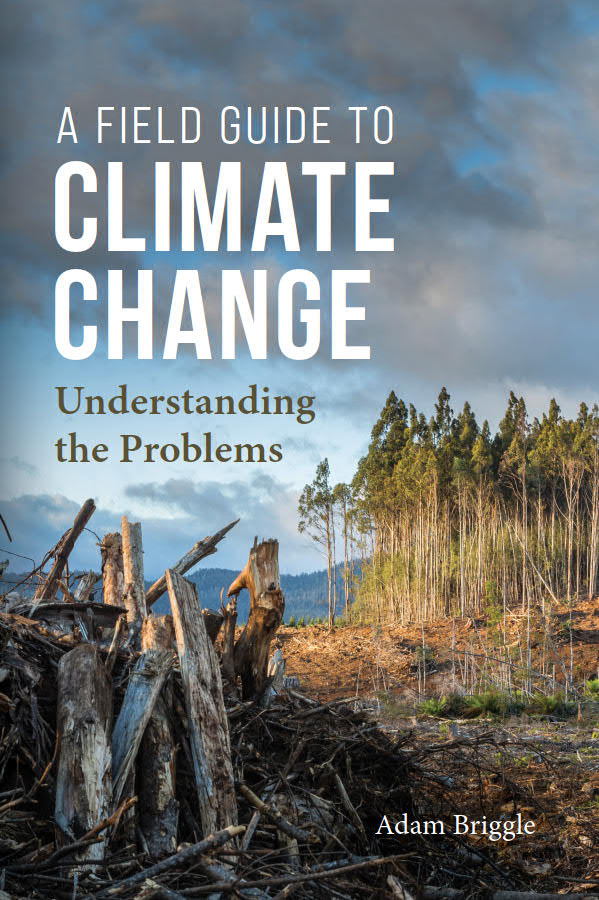
21.0 Supplies (Not Da Kine Kind)
When I was in college, supplies had a different meaning (and no weekend would have been complete without those supplies). But I’ve been “supplies-free” since November 19, 1993. For the purposes of this course, no supplies are required (e.g., blue books, Scantrons, special equipment, etc.)
22.0 The Fullerton College Library: Your Home Away from Home
The FC Library is a treasure trove of information. They also have comfortable couches and chairs and air-conditioning, perfect for escaping climate change. Their online tools, such as their Database, give you access to a number of online journals and publications. I regularly use the library’s website to download articles in support of my work as a writer and teacher. Check out their offerings here: https://library.fullcoll.edu/
23.0 Tutoring: They’ve Got the Answers
The FC Tutoring Center offers two types of tutoring: live tutoring via Zoom and in-person tutoring on campus. Students can log into the ASC (Academic Support Center) online tutoring platform to schedule/view/cancel/reschedule appointments. For more information, visit the ASC website: https://academicsupport.fullcoll.edu/.

24.0 Canvas: Like When You’re Invited to a Weird Relative’s House
 This course uses Canvas as a Learning Management System (LMS) to provide announcements, lecture notes, grades, and other materials and assessments related to the course. It has its quirks—and can confuse and mislead you at times—but once you get the hang of it, you should have no problem getting around and submitting work.
This course uses Canvas as a Learning Management System (LMS) to provide announcements, lecture notes, grades, and other materials and assessments related to the course. It has its quirks—and can confuse and mislead you at times—but once you get the hang of it, you should have no problem getting around and submitting work.
The easiest way to log in is to go the direct route, http://fullcoll.instructure.com. Use your MyGateway credentials (with no @sign in front of the Banner id.) You may also access Canvas through a link on MyGateway. Once logged in, go to the Fullerton tab, scroll down to the Canvas icon, and click on it for your Canvas dashboard.
Occasionally, you may experience problems with Canvas. Just be patient, contact me immediately, and I will work to solve your problem.
LIFE TIP: Complete any written work OUTSIDE of Canvas. Then copy and paste it into Canvas. That way, when Canvas eats your work (which it does on occasion), you have a copy.
For how-to-do-stuff in Canvas, or if you’re just curious about Canvas, try this website: https://guides.instructure.com/.
25.0 I Love E-Mail, Especially When It’s From You
 Email remains the most efficient and effective tool for modern communication between humans. Email is the preferred communications tool of businesspersons, scientists, artists and many other professionals. Developing good email skills and habits can boost and accelerate your career. And it can definitely get you a better letter of recommendation from me if you ever need one. It’s a lot easier for professors to write you a stellar letter when they know you better.
Email remains the most efficient and effective tool for modern communication between humans. Email is the preferred communications tool of businesspersons, scientists, artists and many other professionals. Developing good email skills and habits can boost and accelerate your career. And it can definitely get you a better letter of recommendation from me if you ever need one. It’s a lot easier for professors to write you a stellar letter when they know you better.
These recommendations will earn you the fastest replies from me:
- I answer emails from 630am until 6:30pm daily, except Sundays. But you can send them anytime, 24-7. I don’t sleep with my phone, so you won’t bug me.
- Send you email through Canvas or directly to exploreworldocean@gmail.com, a special gmail account I keep just for students.
- When you send me e-mails, please always type a SUBJECT for your e-mail (like “Help”, “a quick question”, question about exam”, “extra credit submission,” etc). E-mails with untitled subjects often end up in the spam folder.
- In the first line of your email, please always provide your FULL NAME, COURSE, and CRN (First Last, Climate Science, CRN 10478 or13896; please include this).
- To practice being a professional, start all emails with “Dear Professor” or “Dear Professor Sean.” Later, when we get to know each other, “Hey Prof” is okay.
- Please explain your question/problem/issue as best as you can. The more information you provide, the faster I can answer/solve/resolve your issue.
- To be professional, always sign your emails with your complete name as it appears in the official college records.
- If you don’t hear back from me in 48 hours, you might think the world has ended and we’re all going to die, but probably not. Either I feel asleep like a President or your email didn’t arrive. Just please send your email again. You can never send me too many emails if you need help.
- Try to avoid sending email to my fullcoll address. I get a lot of junk at this address and it’s not always easy to spot important emails from students.
- And if I or anyone else with whom you correspond helps you, send a THANK YOU! You’ll be looked upon as a mature, considerate, and thoughtful person when you do.
26.0 Visit my Office, aka the Sea Cave
Before the pandemic, my office was in an old building that smelled like seaweed, so we called it the Sea Cave. Students used to conduct algae research there and we had lots of good times. When I moved to my new office a couple years ago, I forgot about the Sea Cave. But I think it’s time to bring it back. So you can be among the first visitors to the new and improved Sea Cave, no smells included. And that applies to Zoom Sessions, too, my virtual Sea Cave. I go where the Cave goes.
My office is Room 1412-04. That’s the Social Science Building and my office is on the first floor about half way down the main corridor. Please let me know via text or email that you would like to visit me in my office. I’ll do my best to accommodate you.
Also, I’m available Monday thru Friday mornings from 7–8am on Zoom. Let me know via email and I’ll send you a link. Or email me and I’ll be happy to set up another suitable time to meet on Zoom.
And if you want to call and leave me a message about something, please call: (714) 992-7443. Your voicemail will be delivered to me via email.
Text me at (714) 768-7082 (my business phone). I answer texts (within an hour or two) from 9–5p, M–F.
27.0 Course Overview
Ultimately, the goal of college is to prepare you for a successful life and a career beyond college.
In taking this course, you are being trained to master an unfamiliar knowledge set, to apply what you learn in new situations, to think about competing possibilities, and to articulate your rationale for choosing a particular way of thinking.
The most important skill you attain by going to college is learning how to learn.
Knowing how to study and analyze and break information into parts…knowing how to master concepts and develop an understanding of a topic…knowing how to interpret and apply quantitative information…knowing how to solve problems…are skills that you can use every day of your life.
Knowing how to learn is like knowing how to ride a bicycle or snowboard. Once you master it, you’ll know it for life.
I’ll talk a lot in this course about the kinds of study techniques and approaches that brain scientists tell us work best for learning.
Yep. There is a science to learning! (Click here to learn more.)
27.1 Structure of the Course
The course is organized into four major sections each with 4 modules. That’s sixteen modules over the entire semester. Each module may include:
- Reading assignments
- Video viewing assignments
- Occasional articles to read
- Formative Assessments
- Quizzes (on reading and videos)
- Discussion assignments (question prompts and hands-on assignments)
- Summative Assessments
- Exams (on everything we cover)
27.2 Quizzes Help You Master Terms and Concepts
 You are asked to complete 25/32 quizzes during the semester. Your top 25 scores will be counted towards your final grade.
You are asked to complete 25/32 quizzes during the semester. Your top 25 scores will be counted towards your final grade.
Quizzes are a type of formative assessment. They “form” your learning. They are meant to help you master terms and concepts. With the new words you learn, you’ll be able to will impress people at family gatherings or parties with friends.
Quizzes also provide practice for simple quantitative problems to help you gain confidence in your math skills.
Quizzes may be be a mix of multiple choice, multiple answer, dropdown, fill in the blank, matching, calculations, and map/graph interpretations.
Quizzes may be taken an unlimited number of times during the weeks in which they are offered. Your highest quiz score will be counted. Note, however, that even if you score a high score on the first quiz, it’s worth your time to take the quiz several times. That way you will be better prepared for the exams that take their questions from the quizzes.
See Course Syllabus below for specific due dates for quizzes. Hint: Enter the due dates in your smartphone with reminders.
Quizzes are worth 8 points each, a total of 200 points, or 20% of your final grade.
27.3 Discussion Assignments Deepen Your Understanding
 You are asked to complete 5/8 discussion assignments during the semester. Your top 5 scores will be counted towards your final grade.
You are asked to complete 5/8 discussion assignments during the semester. Your top 5 scores will be counted towards your final grade.
Discussion assignments form the core of the work in this course. It’s where you get to explore topics in depth and develop your ability to communicate science to others. Most importantly, it’s where you interact with classmates. Those interactions help you experience different viewpoints and perspectives. They give you a deeper appreciation for the diverse and inspiring humans with whom we live, work, and play. Understanding different viewpoints is the key to solving societal problems.
In most of the assignments, you’ll review articles or watch videos and consider a set of thought questions. Then you’ll write up your analysis and put your best critical thinking on display.
Discussion assignments include the following:
- an original 1-2 page (400-word) post (worth up to 30 points)
- two half-page-each (200 word minimum each) reviews to Canvas-assigned classmates (worth up to 30 points)
Your original responses will be graded on effort, organization, attention to the prompts, and critical thinking. A grading rubric is included with the assignment.
Your peer reviews will be graded for your level of engagement with other students and the helpfulness of your reply to improving the other student’s response.
All posts (including peer reviews) must include a word count or 5 points will be deducted from your total score.
You will need to meet the word minimums for all three posts—your original post and two peer reviews—to be eligible to receive full credit. Posts under the word minimums will receive half credit. Posting nothing earns nothing, so write something.
See Course Syllabus below for specific due dates.
Discussion assignments are worth 80 points each, a total of 400 points, or 40% of your final grade.
27.4 Exams Test What You Know and Understand
 You are asked to complete 5/7 exams during the semester. Your top 5 scores will be counted towards your final grade.
You are asked to complete 5/7 exams during the semester. Your top 5 scores will be counted towards your final grade.
Exams are a summative assessment of your success towards meeting the learning outcomes for a particular section of study (or the course).
Exams assess your ability to identify, define, and use vocabulary from lectures, textbook readings, in-class work, out-of-class work, YouTube lectures, or other study materials.
Exams assess your ability to draw and/or interpret maps, graphs, and tables and solve equations covered in lectures, textbook reading, in-class work, out-of-class work, YouTube lectures, or other assigned materials.
Exams assess your understanding of concepts and your ability to apply and communicate what you have learned.
Exams may be be a mix of multiple choice, multiple answer, dropdown, fill in the blank, matching, calculations, and map/graph interpretations. New exams may build on previous exams.
You may take exams up to three times in during the period in which they are available but you will not see your score or answers until after the due date. That might seem strange, but it simulates exam-taking in a classroom or any other kind of exam-taking in real life. Yep, this is real life.
See Course Syllabus below for specific due dates.
Each exam is worth 100 points, a total of 400 points, or 40% of your final grade.
27.5 Grading Summary
Grading is based on a total of 1000 points.
Quizzes: 200 pts (20%)
Discussion: 400 pts (40%)
Exams: 400 pts (40%)
27.6 My Sort-Of Grading Scale (I’m pretty generous if you make it all the way through the course.)
A = 85%
B = 75%
C = 65%
D = 55%
F = <55%
28.0 Schedule of Topics and Due Dates
Note that “Smart Dates” in parentheses are the recommended due dates for being successful in the course. Avoid procrastination. Manage your time like a pro. You be less stressed and have more time to spend with your favorite pet when you are not crunched to meet a deadline.

| Parts | Module | Chapter | Due Dates (Smart Dates) |
Discussions | Quizzes | Exams |
|---|---|---|---|---|---|---|
| 0 | Don’t Be Dropped. | Friday, August 30, 2024 | Syllabus Quiz | |||
| I. The Dangers and Dilemmas of Climate Science | 1 | Intro: The Tangle & 1. The Anthropocene & Development | (Tuesday, September 3, 2024) | Discussion 1: Post 400-word essay | 1,2 | |
| 2 | 2. What Is Climate Change? | (Monday, September 9, 2024) | Discussion 1: Post two 200-word replies | 3,4 | Exam 1 | |
| 3 | 3. Framing the Climate Problem | (Monday, September 16, 2024) | 5,6 | |||
| 4 | Case Studies: Diversity in Climate Change | Monday, September 23, 2024 | Discussion 2: Post Case Study 1 | 7,8 | Exam 2 | |
| II. The Facts and Figures of Climate Science | 5 | 5. Who Knows? | (Monday, September 30, 2024) | Discussion 3: Post 400-word essay | 9,10 | |
| 6 | 6. What Do We Know? | Monday, October 7, 2024) | Discussion 3: Post two 200-word replies | 11,12 | Exam 3 | |
| 7 | 7. How Do We Know? | (Monday, October 14, 2024) | 13,14 | |||
| 8 | Case Studies: Heatwaves and Vulnerable Populations | Monday, October 21, 2024 | Discussion 4: Post Case Study 2 | 15,16 | Exam 4 | |
| III. The Trials and Tribulations of Climate Science | 9 | 4. Green Growth or Degrowth? | (Monday, October 28, 2024) | Discussion 5: Post 400-word essay | 17,18 | |
| 10 | 8. Climate Politics | (Monday, November 4, 2024) | Discussion 5: Post two 200-word replies | 19,20 | Exam 5 | |
| 11 | 9. Climate Ethics and Justice | (Monday, November 11, 2024) | 21,22 | |||
| 12 | Case Studies: Who Suffers the Most? | Monday, November 18, 2024 | Discussion 6: Post Case Study 3 | 23,24 | Exam 6 | |
| IV. The Perils and Promise of Climate Science | 13 | 10. Climate Policy Fundamentals | (Monday, November 25, 2024) | Discussion 7: Post 400-word essay | 25,26 | |
| 14 | 11. Mitigation, Adaptation, and Finance | (Tuesday, December 3, 2024) | Discussion 7: Post two 200-word replies | 27,28 | Exam 7 | |
| 15 | 12. Geoengineering and Rewilding | (Monday, December 9, 2024) | 29,30 | |||
| 16 | Case Studies: Changing the Conversation | Saturday, December 14, 2024 | Discussion 8: Post Case Study 4 | 31,32 | Exam 8 |
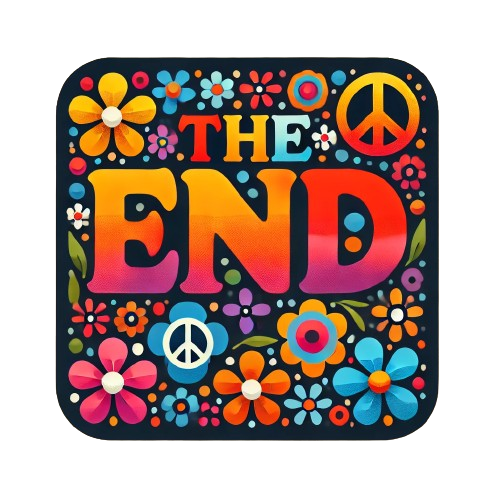






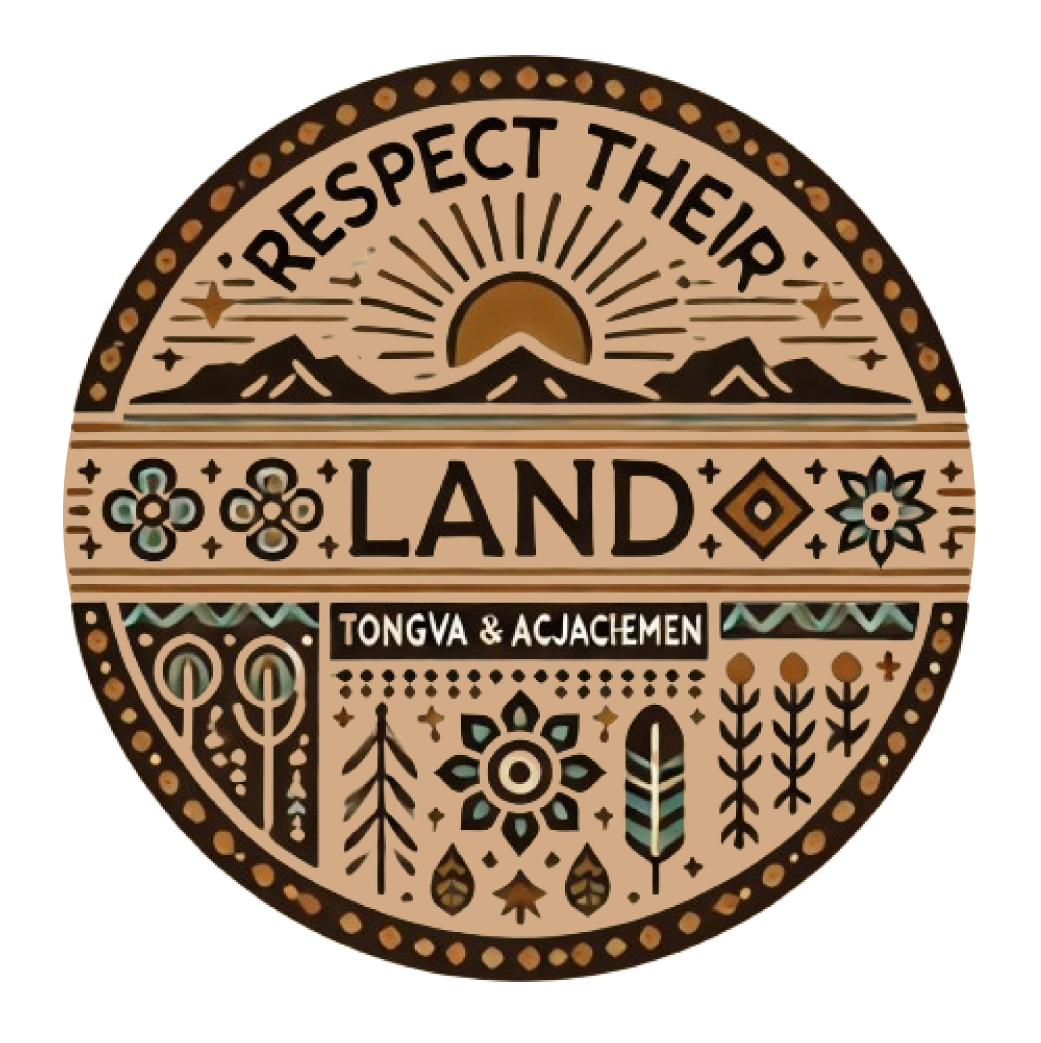
Recent Comments